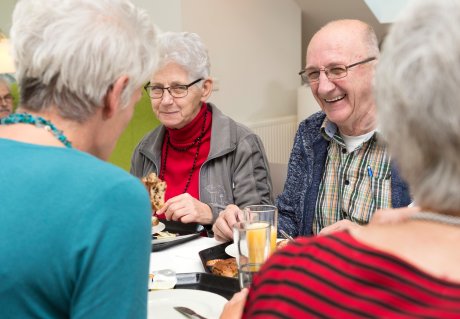
Nutrition and ageing
Nutrition and ageing is a central theme within our chair group. We aim to identify dietary strategies that optimize nutritional status to prevent, slow down or reverse stages preceding ageing-related pathologies such as cognitive decline, sarcopenia, osteoporosis, and malnutrition.
We pay attention to the ageing process from an early stage, by leveraging hallmarks of ageing and biomarkers of ageing. For every stage, during ageing and at older age, we investigate and develop tailored nutritional approaches that prevent or mitigate structural and functional decline, ultimately improving quality of life. Our focus extends beyond healthy older adults to include those who are frail, malnourished, or undergoing rehabilitation.
The main organs and systems of our interest are the brain, the muscle, the bone, the gut and the immune system. We have particular expertise in B-vitamins, vitamin D, (plant) protein, and fibers, and we investigate diets like the MIND diet, the Mediterranean diet, intermittent fasting and plant-based diets, all with and without concurrent (resistance) exercise.
Research topics
Biological ageing
Between individuals of the same chronological age, a lot of heterogeneity is observed. This heterogeneity is captured by biological age. Biological age is a marker of the health state of the individual, and better reflects the risk of morbidity or mortality than chronological age does. The field of biological ageing is emerging, and several ageing clocks and ageing biomarkers have been developed. These new measurements can be used as outcomes in nutrition research. On the one hand, to identify (un)successful agers and understand their lifestyle habits, such as their dietary intake. On the other hand, to assess the effect of nutritional interventions on the pace of ageing.
Cognitive ageing
One of the key changes with (brain) aging is the gradual decline in cognitive functioning. Preventing cognitive impairment and dementia remains one of the biggest challenges of our current society. Our intervention and observational studies therefore focus on the impact of individual nutrients, including omega-3 fatty acids, B-vitamins and vitamin D, along with dietary patterns like the MIND diet, in older adults at increased risk of Alzheimer's disease. Apart from the potentially direct effects of brain-healthy foods and nutrients on cognitive ageing, we additionally investigate the promising role of prebiotics within the microbiota-gut-brain axis. Moreover, we explore the biological effects of nutrition in relationship to lifestyle and biomarkers of cognitive aging and neurodegeneration. Our research takes a multidisciplinary approach, integrating personalized nutritional assessment tools and dietetic skilfulness with (analytical) expertise in nutritional (neuro)sciences, neurochemistry, and metabolomics.
Musculoskeletal health
A major cause of frailty and disability with older age is sarcopenia – the age-related loss of muscle mass. Resistance-type exercise training and nutritional supplementation are considered promising strategies to treat and/or postpone sarcopenia. Well-designed trials have been performed defining new leads for nutritional and exercise interventions. Our research concentrates on nutritional strategies to prevent or treat the progressive loss of muscle mass, strength and physical performance with ageing, using novel, sensitive and specific assessment methods.
Osteoporosis is a multifactorial disease increasing bone fragility and susceptibility to fractures. The nutrients calcium and vitamin D are required for proper bone health and reducing fracture risk. Our research explores the potential of dietary protein for maintaining bone health later in life. Additionally, nutritional strategies to improve rehabilitation after a fracture are investigated.
Nutrition and inflammaging with emphasis on
immunosenescence and organ crosstalk
As we age, our immune system gradually declines, it becomes less effective at clearing infections and damaged cells. This dysfunction of the aged immune system, termed immunosenescence, leads to the increased production of inflammatory mediators, contributing to “inflammageing”. This chronic, low-grade inflammatory state accelerates the ageing process and is associated with the onset and progression of age-related diseases. Moreover, inflammageing alters communication between different organs, leading to systemic effects including muscle wasting and functional decline. Current research investigates immune function in elderly populations both under challenging conditions – such as serious illness, physical trauma, or surgery – and in healthy individuals. Additionally, efforts are focused on elucidating the mechanisms through which inflammageing impacts organ crosstalk and how nutrition and lifestyle can influence these processes.
Plant-based nutrition and ageing
The transition to more plant-based diets is actively recommended by the Dutch Health Council. This transition reduces the environmental impact of our food systems, and could be beneficial for the health of the Dutch population. A successful protein transition must include the large group of older adults in the Netherlands. However, some mismatches between the characteristics of plant-based diets and the specific nutritional needs or reduced bioavailability in older adults are present. We research the effects of shifting to plant-based diets in older adults on nutritional intake, body composition and musculoskeletal health. Additionally, we develop strategies that allow older adults to partake in the protein transition in a healthy way.
Public health nutrition
An important step is to translate scientific evidence on nutrition, exercise and physical activity in relation to nutritional, functional and health status of elderly people to practice. Based on these scientific insights effective public health interventions will be developed in response to sustainability issues, practical needs and in close collaboration with local authorities and stakeholders.









